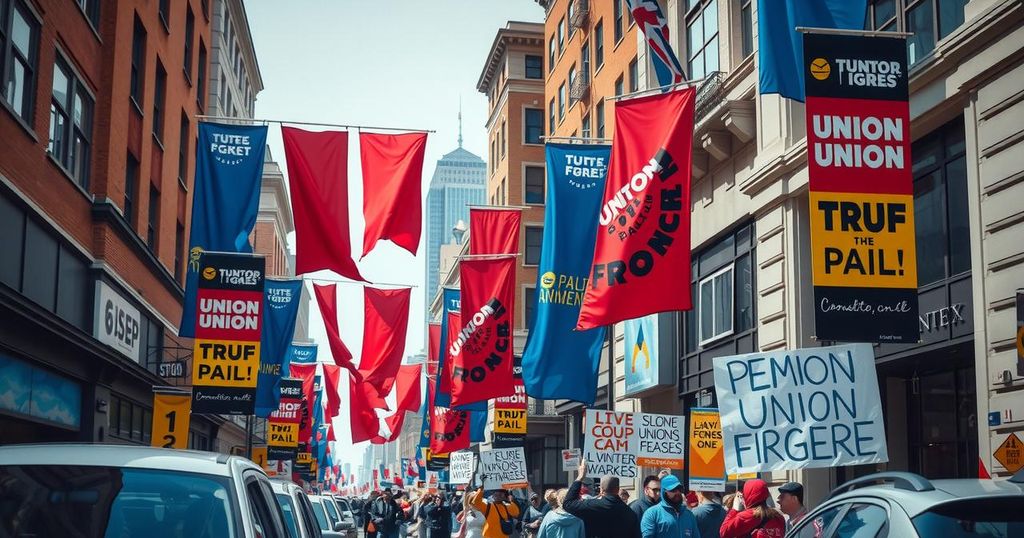Milei Promises End to Inflation Amid Rising Union Protests
President Javier Milei aims to end inflation by mid-next year, but faces mounting union protests against his austerity measures. While he celebrates fiscal progress and a deal with the IMF, labor unrest highlights rising discontent regarding economic hardships faced by the population. Political analysts warn of serious socio-economic disparities as the government’s policies are put to the test.
President Javier Milei has boldly announced that he anticipates inflation will be eradicated by mid-next year, claiming his government is among the best in Argentina’s history. However, this proclamation arrives amid intensifying pressure from unions dissatisfied with his stringent austerity measures. These cuts, critics argue, have disproportionately hurt millions of Argentinians, complicating their ability to meet basic needs.
During a Wednesday address at the EXPO EFI 2025 event in Buenos Aires, Milei, 54, stated, “inflation has its sell-by date for the middle of next year and now is the time to think of growth.” He acknowledged progress in stabilizing the economy while cautioning that challenges remain. The President touted his administration’s fiscal results, declaring the nation’s emergency period to be over.
Milei further emphasized the recent partial lifting of currency and capital controls, which have been restrictive since 2019. He criticized these controls, referred to as “cepo,” describing them as counterproductive for those looking to save and invest in the future. Additionally, he pointed to his successful $20 billion deal with the International Monetary Fund (IMF), which he defended against critics who doubted its feasibility.
In a stark contrast to Milei’s assurances, union leaders mobilized thousands of members for a protest against the austerity measures soon after his speech. This mostly peaceful demonstration coincided with Labour Day preparations, although tensions resulted in 14 arrests following minor skirmishes. The protest was organized by the CGT, Argentina’s largest union group, which accused the government of ignoring the grievances of workers.
Following the protest, the UTA transport union declared a bus strike for May 6, citing failed negotiations with employers amid the government’s wage cap aimed at controlling inflation, which hit a monthly rate of 3.7 percent in March. Aside from the arrests linked to disturbances, authorities reported that 29 buses used for the protest were temporarily detained for various infractions.
At the CGT rally, Father Lorenzo “Toto” de Vedia represented slum priests, calling attention to the grave socio-economic disparities and lamenting the absence of state support. “Nobody can reach the end of the month,” shared Gisela, a cleaning lady, echoing widespread sentiment about increasing inequality in the country.
Since Milei took office in December, his government’s austerity approach has led to a public spending cut of 4.7 percent of the GDP, according to the IARAF think tank. This drastic measure had a notable impact, reducing annual inflation from 211 percent in 2023 to about 118 percent the following year, although monthly price increases are ranging from two to four percent.
While delivering his speech at EXPO EFI, Milei did not address the ongoing labor protests or the CGT demonstration, instead opting to celebrate a 30-percent reduction in government size. With regard to criticisms surrounding his policies, he resorted to caustic language aimed at opponents who lament social issues under his administration. Milei proclaimed, with his metaphorical “chainsaw,” that he has initiated the most significant adjustment in history.
Political analyst Artemio López, however, noted the precarious social conditions, claiming that income distribution is at its worst level in two decades. On the same day, pensioners gathered in front of Congress to protest their circumstances, causing traffic disruptions, while law enforcement ensured compliance with the government’s anti-picketing protocols.
In summary, while President Milei projects confidence in overcoming inflation and promoting growth, the mounting unrest from unions and protesters highlights the significant challenges and disparities that continue to affect many Argentinians as the administration presses forward with its controversial austerity policies.
In conclusion, President Javier Milei’s confident declaration of an impending end to inflation is met with skepticism amid rising labor unrest. As unions voice concerns about the detrimental impacts of his austerity cuts, tensions continue to rise. Despite some measured success in reducing inflation rates, the socio-economic landscape remains critical with workers expressing their struggles. Thus, the Milei administration faces significant challenges moving forward.
Original Source: www.batimes.com.ar




Post Comment